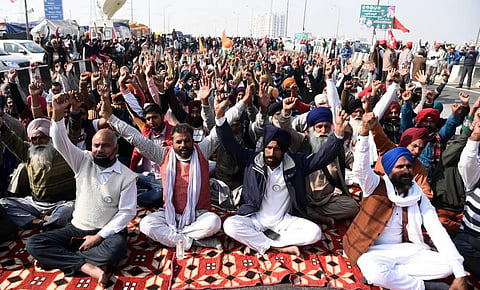Farmers protests: Parliament panel scrutiny could have averted deadlock, say experts
NEW DELHI: While farmers have been agitating for over a month objecting to some key provisions of the new agri laws, one of the main grouses of political parties is about the Modi government riding roughshod over the parliamentary procedures.
When the opposition parties had complained to President Ram Nath Kovind back in September over the government disregarding their view that the farm Bills should be sent to either a parliamentary select committee or a standing committee, it was only underlining the NDA dispensation’s increasing reluctance to bypass such committees to scrutinise crucial Bills.
Parliament data shows the criticism is not unjustified. While both Houses — Lok Sabha and Rajya Sabha — have done record business and passed a large number of Bills under the NDA government, far lesser number of legislations have been sent to standing committees for scrutiny before being enacted.
In the 16th Lok Sabha (2014-19), only 25% of the Bills introduced were referred to the parliamentary committees, much lower than the 71% and 60% in the 15th and 14th Lok Sabhas, respectively.
The percentage is even lower in the current Lok Sabha, with only about 10% of Bills tabled having been referred to committees, as per the data from the House. Opposition parties and experts have contended that had the farm Bills been sent for the standing committee’s scrutiny, the farmers’ agitation could have been avoided.
“Unfortunately, the government neither sent this Bill to a select committee nor a standing committee. Had this been done, this would have been a very good Bill and would have benefited the farmers,” Congress leader Ghulam Nabi Azad had said when he, along with other Opposition leaders, had met the President on September 23 requesting him not to sign the Bills.
The farm Bills are not the only ones that skipped a parliamentary committee’s scrutiny in the 17th Lok Sabha. While 28 Bills were passed during the Budget session last year, no new Bill was referred to any committee.
In the 16th Lok Sabha, 133 Bills were passed, but only 24 were sent to parliamentary committees. In contrast, of the 165 Bills passed in the 15th Lok Sabha, 68 were sent to committees.
Former LS secretary general PDT Achary is of the view that important Bills must be sent to these committees.
“Most of the important Bills should be referred to the committees. That’s why these committees were formed,” he said.
“Had the farm Bills been referred to the committee (on agriculture), it would have called all the stakeholders and taken their views, would have held discussions with agriculture scientists and experts and on the basis of all the discussions, would have made its recommendations to improve the Bill,” Achary said.
“Our experience is that once a Bill goes to a committee, it comes back in a much better form, so you have a better law than what was originally tabled,” he added.
Constitution expert Subhash Kashyap has similar views.
“The intention of setting up a subject related or department related committee is that all Bills will be sent. The whole idea was to develop some ministry-wise specialisation in legislature and to send, so far as possible, all the Bills for scrutiny to these committees. But only a few are being sent. That is not correct in my opinion,” he said.
The system of department related standing committees was instituted by Parliament in 1993. There are 24 such committees.
Kashyap said the idea was to have in-depth examination of provisions of the Bills so that enacting hasty or flawed legislations could be avoided or the shortcomings of a Bill removed.
“It is for the government and Parliament to consider why more Bills are not being set to the committees.”
Squeezing role of Standing Committees
10% 17th Lok Sabha of the Bills introduced were referred to committees.
25% 16th Lok Sabha of the Bills introduced were referred to committees.
71% 15th Lok Sabha of the Bills introduced were referred to committees.
60% 14th Lok Sabha of the Bills introduced were referred to committees.
System that has stood test of time
The system of department related standing committees was instituted by Parliament in 1993.
Currently, there are 24 such committees such as those on finance, home affairs, defence etc.
These standing committees examine Bills that are referred to them.
They also examine the expenditure plans of ministries in the Union Budget. In addition, they may examine the working of the departments and schemes of the government.

